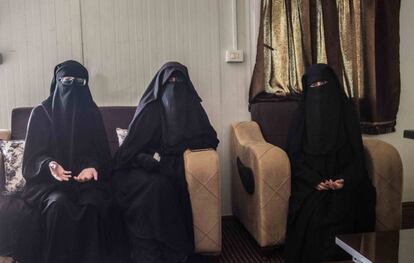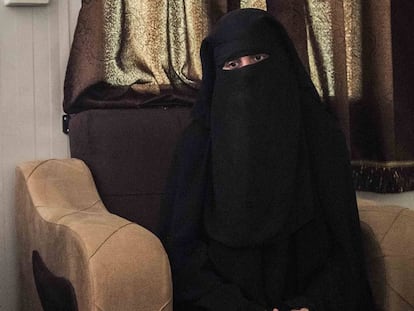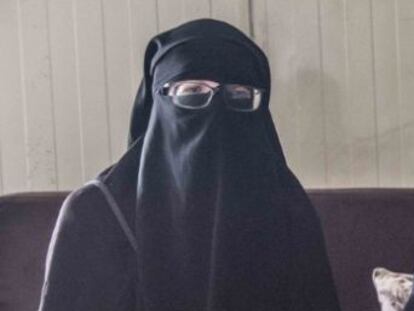Spain issues arrest warrants for ISIS women trapped in Syrian camps
The three Spaniards and one Moroccan traveled to the war-torn country in 2014, and have since ended up in a Kurdish-run detention center with 17 minors under their care

Spain’s High Court, the Audiencia Nacional, has recently issued arrest warrants for four women who traveled to Syria in 2014 to join the Islamic State (ISIS).
All four are currently being held in two detention camps run by Kurdish militias in Syria, two sources close to the investigation have told EL PAÍS.
Three of the women are Spanish nationals and the fourth is a Moroccan woman who was married to a jihadist with Spanish citizenship. He was killed in ISIS’ self-proclaimed caliphate. The latter woman has three children who hold Spanish nationality.
The Spanish government has been analyzing the case since April, when this newspaper revealed their presence
The four – who have a total of 17 children under their care, including a newborn – are wanted by several Spanish courts for “terrorism-related crimes,” according to police sources.
The alleged jihadists – Luna Fernández, Yolanda Martínez, Lubna Mohamed Miludi and Loubna Fares – are being held in camps for relatives of ISIS fighters. Fernández and Martínez are at Al Roj camp, in northern Syria, near the border with Turkey. Miludi and Fares remain in Al Hol, the camp in northeast Syria that all four were taken to after the fall of Baghouz, the last ISIS redoubt, in February.
The Spanish government has been analyzing the case since April, when EL PAÍS revealed their presence at the Syrian camps, where living conditions have been described as extremely unsanitary and dangerous. A committee of officials from the Foreign, Interior and Justice ministries are reviewing the case and considering repatriation options, in line with similar action by other European Union countries such as France or Germany.
At least two of the four women – Luna Fernández and Yolanda Martínez, who converted to Islam – are classified as “dangerous” in police records
There are security concerns on the table as well: at least two of the four women – Luna Fernández and Yolanda Martínez, who converted to Islam – are classified as “dangerous” in police records.
If they returned to Spain, they would be immediately arrested and probably held in preventive custody. They could face charges of collaborating with, or being members of, a terrorist organization, a crime that entails prison terms of six to 12 years.
While the executive studies the case, several investigating courts have issued arrest warrants against all four women. Spain has no extradition agreement with Syria, which has been at war for eight-and-a-half years. It does have a business attaché in Beirut who periodically visits the capital city Damascus.
Legal sources said that the government is proceeding very cautiously as the case has criminal, security and even humanitarian implications, given the presence of minors. In May, the NGO Doctors Without Borders reported that 8,000 women and more than 3,000 children inside the Al Hol camp have no access to medical care.
The investigation is dragging out in Spain, which still has an acting government following the inconclusive April 28 election
In April, prosecutors at the High Court asked the Interior Ministry for a report on the Spanish women, who were asking to go back to Spain with their own children as well as the ones they are caring for. They all claim that they followed their husbands to the conflict zone without realizing what they were getting into. Counter-terrorism sources noted that at least two of them, Yolanda Martínez and Luna Fernández, show up in earlier High Court investigations into a jihadist cell known as the Al Andalus brigade.
The investigation is dragging out in Spain, which still has an acting government following the inconclusive April 28 election. By contrast, Germany and France have been moving more rapidly, the former having brought four children back from Syria in mid-August, with the latter having already repatriated a dozen orphans.
English version by Susana Urra.









































